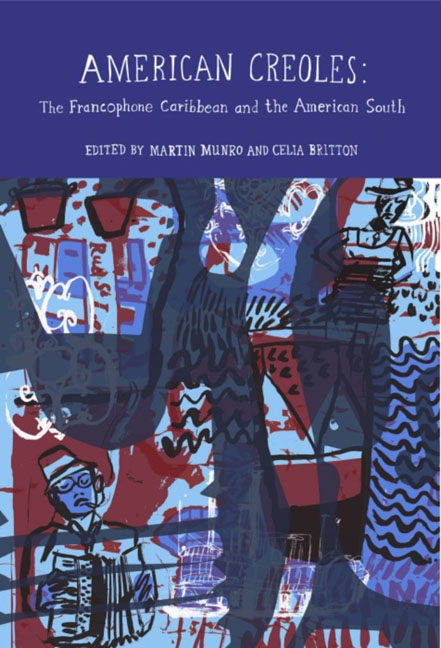Book contents
- Frontmatter
- Contents
- List of Illustrations
- Acknowledgements
- Introduction
- Creolizations
- Lafcadio Hearn's American Writings and the Creole Continuum
- Auguste Lussan's La Famille créole: How Saint-Domingue émigrés Became Louisiana Creoles
- Caribbean and Creole in New Orleans
- Creolizing Barack Obama
- Richard Price or the Canadian from Petite-Anse: The Potential and the Limitations of a Hybrid Anthropology
- Music
- Intertextualities: Faulkner, Glissant, Condé
- Notes on Contributors
- Index
Richard Price or the Canadian from Petite-Anse: The Potential and the Limitations of a Hybrid Anthropology
from Creolizations
- Frontmatter
- Contents
- List of Illustrations
- Acknowledgements
- Introduction
- Creolizations
- Lafcadio Hearn's American Writings and the Creole Continuum
- Auguste Lussan's La Famille créole: How Saint-Domingue émigrés Became Louisiana Creoles
- Caribbean and Creole in New Orleans
- Creolizing Barack Obama
- Richard Price or the Canadian from Petite-Anse: The Potential and the Limitations of a Hybrid Anthropology
- Music
- Intertextualities: Faulkner, Glissant, Condé
- Notes on Contributors
- Index
Summary
On the cover of the second edition of Richard Price's The Convict and the Colonel: A Story of Colonialism and Resistance in the Caribbean (1998), Maryse Condé comments that the author's ‘research is more fascinating than a piece of fiction’. American anthropologist Richard Price's study of the role of memory in modern Martinican society examines the strange fate of a social pariah, Médard Aribot, thief and artist, who, following his return from prison on Devil's Island, divided his time during the final years of his life between Petite-Anse and the town of Le Diamant in the south west of Martinique. The first 100 pages of the work set out the results of a scholarly anthropological investigation, combining documents and interviews conducted by Price on the life of Médard and on the furore surrounding the 1925 municipal elections in Le Diamant. The last portion of the book, by contrast, presents the anthropologist's own life: his encounter with Martinique and his reflections on the process of modernization that the island has undergone. This part aims to explore ‘how one generation's powerful historical metaphors could so quickly become the next generation's trivial pursuit’ (Price, 1998: 157).
Given the composite and often eclectic construction of this work which combines travel narratives, self-portraiture, documents, letters and critical commentaries, and in which we hear many different voices, it should come as no surprise that Price's anthropological work was cited by James Clifford in Writing Culture as a demonstration of the ‘serious partiality’ that characterizes a form of anthropology which inclines towards the literary. In Clifford's view, this approach has the virtue of defining the limits of certain epistemological ground rules in anthropological field work and of making explicit the fact that it is possible to gain knowledge of a culture without losing sight of the way in which that knowledge has been constructed (Clifford and Marcus, 1986: 7–8). Clifford is referring to Richard Price's First Time: The Historical Vision of an Afro-American People (Price, 1983). For Clifford this ‘serious partiality’ derives from Price's exposure of the constructed nature of knowledge and from a foregrounding of the techniques of writing.
- Type
- Chapter
- Information
- American CreolesThe Francophone Caribbean and the American South, pp. 95 - 110Publisher: Liverpool University PressPrint publication year: 2012

